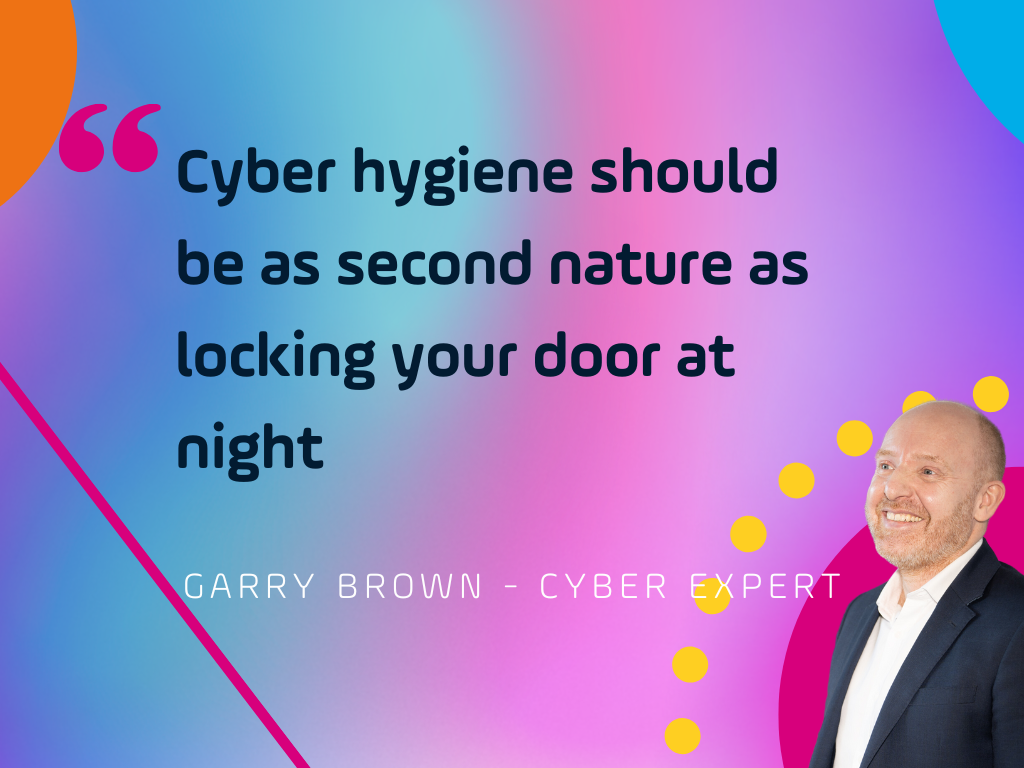Cyber Hygiene: Your Digital Shield in 2025
In our increasingly connected world, maintaining good cyber hygiene is as crucial as personal hygiene. As we approach 2025, let’s explore essential cybersecurity practices to keep your digital life safe and secure.
What is Cyber Hygiene?
Cyber hygiene refers to the regular practices and precautions users take to keep sensitive data organised and protected from theft or outside attacks.
It’s about maintaining the health and security of users, devices, networks, and data.
Let Bondgate IT help improve your cyber hygiene.
Cyber hygiene is a core part of a robust cybersecurity strategy. It should be as second nature as locking your door at night – a regular, essential part of your every day.
If it becomes something perform regularly it will go a long way to helping keep our data secure.
Garry Brown, Managing Director of Bondgate IT and Cyber Expert for the NEBRC
Why is it Important?
With cybercriminals constantly evolving their tactics, good cyber hygiene is your first line of defense. It helps prevent data breaches, protects your privacy, and ensures your devices function optimally.
Cyber hygiene is your daily dose of digital preventative maintenance, helping to safeguard your data, devices, and users with simple yet crucial practices.
It’s the first line of defence against the ever evolving cyber threats.
Dan Gardner, Head of Cyber Security at Bondgate IT
Essential Cyber Hygiene Practices for 2025
1. Strengthen Your Passwords
Gone are the days when “NameOfPet14” would suffice. In today’s digital landscape, you need to up your game. Think of passwords as the locks on your front door – the stronger, the better. Opt for long, complex passwords or, better yet, passphrases. Something like “ILoveMarmite&Cheese!” is both memorable and tough to crack.
If you’re struggling to remember all your passwords (and let’s face it, who isn’t?), consider using a password manager. It’s like having a secure vault for all your digital keys. And don’t forget to enable two-factor authentication (2FA) on all your accounts. It’s an extra layer of security that could save your bacon one day.
2. Keep Software Updated
We’ve all been guilty of clicking “remind me later” when those pesky update notifications pop up. But here’s the thing – those updates are crucial. They’re not just about new features; they’re often patching up security holes that hackers could exploit.
Enable automatic updates wherever possible. It’s like having a diligent butler who keeps your digital house in order. For software that doesn’t update automatically, make it a habit to check for updates regularly. And if you’re still running that ancient version of Windows or that outdated app? It’s time to bid farewell and upgrade to something that still receives security updates.
3. Be Cautious on Public Wi-Fi
Public Wi-Fi is a bit like a public toilet – convenient when you need it, but you wouldn’t want to leave your valuables lying around. When you’re out and about, where possible use your mobile hotspot and connect to your business systems using a VPN.
It’s like creating a private tunnel through the public network, keeping your data safe from prying eyes.
Avoid accessing sensitive information, like your bank account, when you’re on public Wi-Fi. Save those tasks for when you’re on a secure network. And while we’re at it, turn off that auto-connect feature on your devices. You don’t want your phone cosying up to every dodgy network it comes across.
4. Recognise and Avoid Phishing Scams
Phishing scams are the digital equivalent of someone trying to nick your wallet. They’re getting cleverer by the day, but there are still ways to spot them. Always check the sender’s email address – is it really from your bank, or is it from “totallylegitbank@scammer.com”?
Be wary of messages that create a sense of urgency or threat. The taxman isn’t going to arrest you via email, promise. And before you click on any links, hover over them to see where they’re really taking you. It’s like checking the peephole before opening the door.
5. Backup Your Data Regularly
Backing up your data is like insurance – you hope you’ll never need it, but you’ll be bloomin’ glad you have it if disaster strikes. Follow the 3-2-1 backup rule: keep three copies of your data, on two different types of storage, with one copy off-site.
Cloud storage services are brilliant for off-site backups. They’re like having a secure storage unit in the digital world. And don’t just set and forget – regularly test your backups to make sure they actually work. There’s nothing worse than thinking you’re covered, only to find your backup failed when you need it most.
6. Review Privacy Settings
Your social media privacy settings are like the curtains on your windows – you want to make sure they’re properly closed. Regularly check and update these settings, especially after platform updates. You might be sharing more than you realise.
Be mindful of the personal information you share online. Do you really need to tell Facebook your exact date of birth? Probably not. And consider using privacy-focused browsers and search engines. They’re like the digital equivalent of wearing sunglasses and a hat – they help you keep a low profile.
7. Educate Your Team on Cyber Safety
Cyber safety isn’t just about protecting yourself – it’s about protecting your whole team.
The best protection is education and open communication. Encourage your teams to talk about their online experiences. Get them to tell when something doesn’t feel right.
By implementing these practices, you can significantly enhance your online security and protect your digital assets.
Want to learn more about improving your cyber hygiene?
Contact Bondgate IT today for expert advice and support in securing your digital life.
